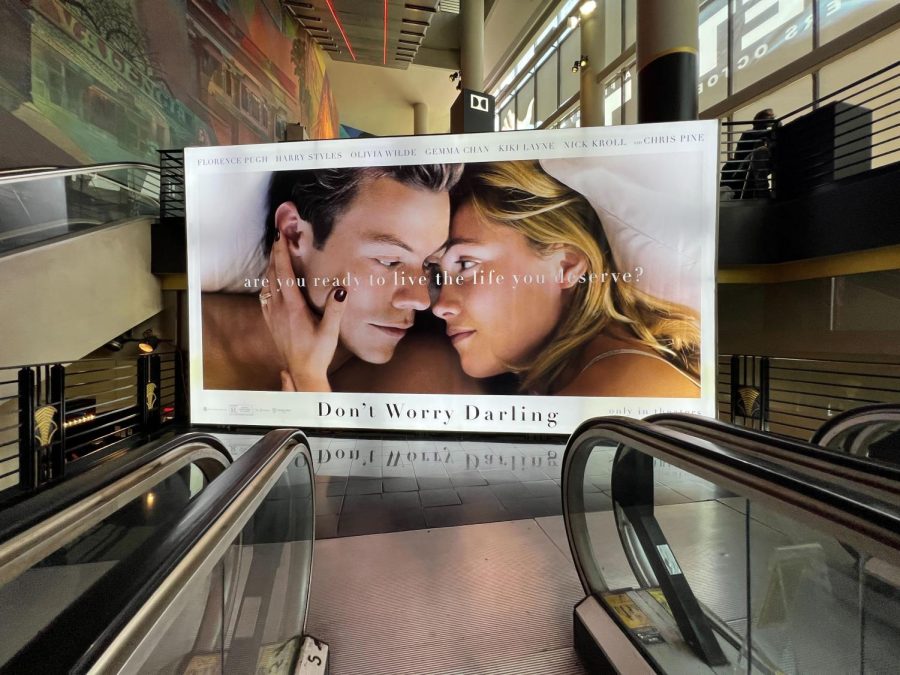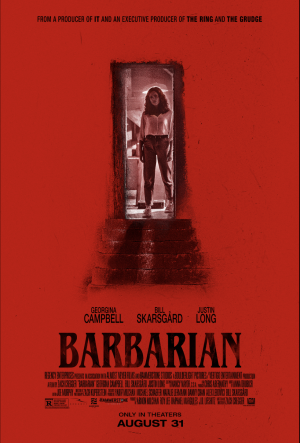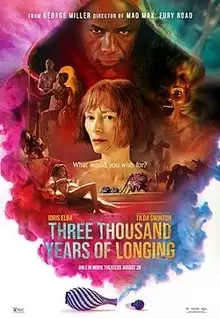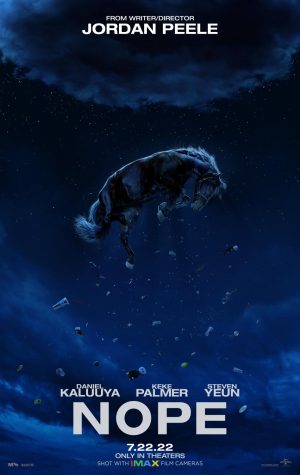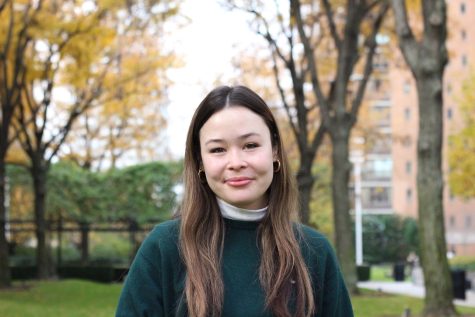‘Don’t Worry Darling’ Is Organized Chaos
Amid cast drama and mediocre reviews, the film amounts to half of its potential
Sex scenes were a selling point of “Don’t Worry. Darling,” but their meaning isn’t fully realized in the film.
October 5, 2022
The psychological thriller “Don’t Worry Darling,” directed by Olivia Wilde, has caught media attention for the better part of a year. The film is largely about autonomy, so the feuds between cast members add a dimension of irony. Yet, even without the outside noise, “Don’t Worry Darling” contends with interior chaos.
The on-set drama began when Harry Styles replaced Shia LaBoeuf as the character Jack. Then, the rumors that Styles and Wilde developed a relationship because of the film started to circulate.
As the release date loomed near, the lead actress in the film, Florence Pugh, was not promoting “Don’t Worry Darling” on social media or during the press tour. Typically, Pugh will attend the press junkets for her movies and post the trailers and sneak peeks on her Instagram. Pugh cited scheduling conflicts, but Twitter users speculated that there was a larger contention between Wilde and Pugh. Conflicts allegedly ensued between the leading actress and director, either over casting, payroll or the film’s substance.
Naturally, projected tensions among the cast incited a media frenzy over “Spitgate” at the Venice Film Festival, in which people claimed to witness Styles spit on co-star Chris Pine. Since the film’s release, more cast drama has surfaced.
Disagreements and relationships such as these are likely to occur often during the filmmaking process — I didn’t feel a need to hold Wilde to an unprecedented standard because of the drama, although it contributed to the draw of the film.
As an admirer of Styles’ music, Gucci modeling, and toast munching in Christopher Nolan’s “Dunkirk,” I did not have high expectations for his performance in the film but was curious to see if he would pull it off. Rather, I expected Pugh to carry the film and the plot since she displayed her acting prowess in the 2018 thriller “Midsommar.” Mostly, I was interested to see how Wilde would execute what appeared to be an intriguing story.
“When it’s reduced to your sex scenes, or to watch the most famous man in the world go down on someone, it’s not why we do it. It’s not why I’m in this industry.” Florence Pugh
“Don’t Worry Darling” follows Jack (Styles) and Alice (Pugh) as a happy couple in the 1950s, living in a company-created town named Victory. The wives in the neighborhood are expected to stay home, cook, clean and unwind while the husbands depart to the desert where they work at Headquarters each day for the Victory Project manager, Frank (Pine). The women are commanded to never leave the confines of Victory and venture into the empty desert or Headquarters — or to ask questions about Victory. Eventually, Alice is ostracized when she tries to uncover the secrets of Victory.
The first half of the film struggles to convey that Frank is watching his residents. The only obvious surveillance occurs during a sex scene. Pugh commented on the primarily female-pleasure-based sex scenes in the film which were seen as a “selling point” of the film in a Harper’s Bazaar interview: “When it’s reduced to your sex scenes, or to watch the most famous man in the world go down on someone, it’s not why we do it. It’s not why I’m in this industry.”
Although the sex scenes are one of many elements to cling to in the trailer, the film’s first hour made them the centerpiece. I understood the scenes as a maintenance of women’s pleasure so that women remained unsuspicious and supposedly liberated, yet the context revealed about Victory is that the Project is predicated on male pleasure. It seems as though Wilde was attempting to push some sort of envelope but got lost in the irony without fully realizing the meaning of those scenes.
If the world didn’t already view Styles as a sex symbol due to his rockstar status and scientifically symmetrical face, this film seemed to nearly exploit that. Jack is a central character in the film, but Styles does not provide the character with substance beyond his good looks and infatuation with Alice. Styles may not think that he has to try, because he is Harry Styles; he is a success not only because of his musical and entrepreneurial talent, but because of his face. Thus, the plot is restricted to a surface level commentary on passive masculinity.
I usually defend Styles in his endeavors. However, with his acting — or lack thereof — I cannot. Jack’s dialogue walks a fine line between witty banter and fanfiction foolery. A good actor could harness the banter — Styles cannot. He stumbles in delivering his lines as Pugh overtakes each scene, mastering Alice’s intensity.
The film skirts around a larger message of free will to grasp at what Wilde has named the theme of the film: “doing what’s right.” But audiences never learn exactly how Alice’s so-called moral obligations play out.
At the film’s conclusion, Alice focuses on saving herself because she is told to, yet she is supposed to have regained her autonomy. The audience is left questioning how Alice will save herself and if she will attempt to save others. Both Alice and Margaret (Kiki Layne), the first wife to trek into the desert, lack the character development necessary to avoid the thematic paradox the film creates. In fact, Layne claimed in an Instagram post that she was cut from much of the film. For a film without a sequel in sight, the lack of a rounded plot emphasizes a thematic paradox that could have been resolved with active dialogue, on and off screen.
“Don’t Worry Darling” is a comedy and a mystery: a comedy in supplementary dialogue that lacks directive emotion, and a mystery in all the unexplained details of Victory and its residents. Moviegoers will leave the theater asking: What now? Asking that question doesn’t seem worth the answer.
To partially quote a response from Styles at this year’s Venice Film Festival, “Don’t Worry Darling” “feels like a movie.” I’m just not convinced it’s a fully formed one.

